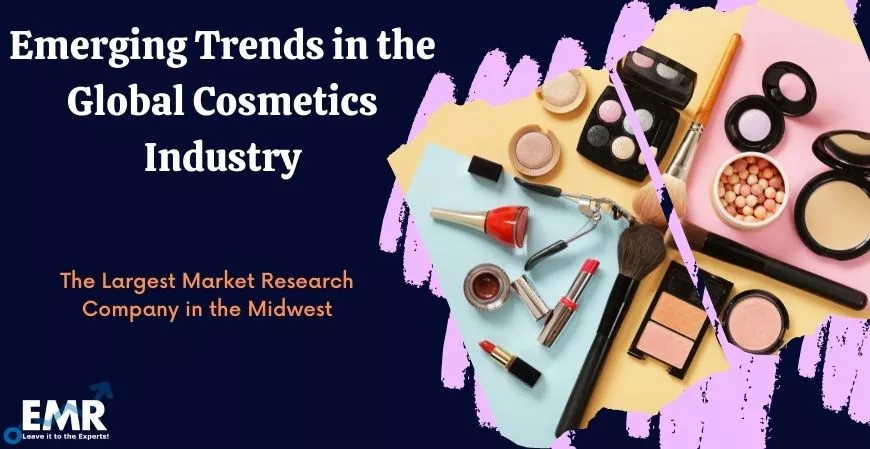The cosmetics market was valued at USD 361.23 Billion in 2025 and is projected to grow at a CAGR of 5.20% during 2026-2035, reaching USD 599.71 Billion by 2035.
The consumers are increasingly moving towards organic and plant-based skincare items. Skincare will be the next big segment to see a significant evolution in terms of reducing carbon emissions. For a variety of reasons, people are attempting to shift to plant-based skincare products. One of the reasons is to have as little impact on the environment as possible. Another important reason is that people want to avoid harsh chemicals in their skincare routine and instead use naturally occurring ingredients. Part of this stems from a desire to have glowing skin without the need for makeup and the desire to avoid wrinkles and other signs of ageing. Many people consider skincare to be therapeutic, which has contributed to the growth of the industry. Moisturisers, cleansers, serums, and exfoliants have performed particularly well. Demand for collagen, vitamin C, and CDB-infused skincare products has increased as these ingredients have become prominent in the industry.
Read more about this report - REQUEST FREE SAMPLE COPY IN PDF
As a result of this trend, many businesses have tried a marketing strategy known as greenwashing, which involves labelling products as natural, clean, green, or eco-friendly, when they are not. This has sparked some debate, as brands have profited from consumers' desire for truly natural alternatives. Cosmetic brands that are accused of testing on animals are seeing a decline in sales, forcing them to introduce cruelty-free product lines to avoid losing market share. Organic and ethical products are gaining ground on traditional chemical-based branded products, despite being more expensive and having a shorter shelf life.
Due to the closure of salons, the demand for DIY hair, nail (stick on nails), and skin packages has increased. According to a Nielson report, hair clipper and hair dye sales in the United States increased by 166% and 23%, respectively, in the first week of April 2020, compared to a year ago. Since the lockdown began in March 2020, online sales of nail polish have increased by double digits every week in the United Kingdom. DIY and self-care trends are likely to continue in the future as many countries remain in lockdown. DIY pampering products, such as nail kits, body waxing, boxed hair dye, and facial kits, have grown in popularity. Shaving and hair removal products saw a 97% increase in annual order volume, while nail supplies saw a 175% increase. Viewership of YouTube videos and tutorials related to at-home pampering has also increased.
Consumers nowadays are concerned about the environment and seek products that are both sustainable and biodegradable. This shift in perception has already been noticed by beauty brands. Many brands have committed significant resources to launching eco-initiatives by 2020. Unilever, the world's largest cosmetics company, launched in-store refill trials at an Asda store in the United Kingdom in 2020. Love Beauty and Planet, a line of 100% sustainable and environmentally friendly products, was also introduced by the company. To incorporate the circular economy, Procter & Gamble plans to launch a shampoo refill scheme in 2021. Many beauty and personal care companies have stated that health, social, and environmental issues will be prioritised in the future. Globally, strict regulations exist to ensure that businesses take their ethical and moral responsibilities seriously.
Due to the COVID-19 pandemic, there was tremendous increase in e-commerce. This shift benefited beauty brands as well. In the first quarter of 2020, Sephora, a leading beauty brand, reported a 30% increase in online sales in the United States compared to the same period in 2019. During this time, Amazon's beauty product sales also increased. People relied on online shopping to purchase their favourite products after brick-and-mortar stores closed for several months. Beauty retailers can now improve their online shopping experiences even with technological advancements.
Consumers can now also try on makeup by uploading a photo to their mobile devices using augmented reality, virtual reality, and other technology. They can then experiment with different colours and textures to see what they like instead of relying on in-store samples. Retailers benefit from e-commerce because it provides them with access to valuable data and analytics that allow them to track consumer behaviour and understand demand trends. The company can better understand who is buying their products if they have access to these statistics.
Based on distribution channel, the e-commerce segment is expected to witness robust growth over the coming years. The growth is attributable to increased internet penetration in both urban and rural areas. The online channels enable the companies to reach a mass population and have a huge audience for their products. In recent years, the growing focus of major players on strategising online marketing campaigns to increase their revenues have significantly contributed to the growth of the segment.
Based on category, the skincare segment dominates the market. The increasing consumer awareness regarding the benefits of plant-based skin-care products, which cause no side effects, is expected to further propel the market growth in the coming years. Owing to the introduction of varieties of products and massive technological development, Europe accounted for a significant share in the industry. The growth of the cosmetics industry in Europe has been driven by various factors like the escalating use of anti-ageing cosmetics and the increasing demand for premium and clean labelled products in the region.
Although hand sanitiser is not typically considered a beauty product, beauty companies have taken the initiative to add hand sanitisers to their product lines due to the pandemic. Since alcohol is a major component of effective hand sanitisers, the products are known to leave hands feeling dry and chapped. That’s why moisturising hand sanitisers created a robust business growth in 2020. To meet this growing demand, some major beauty companies have developed formulas that maintain adequate disinfectant levels while also incorporating moisturising ingredients that leave hands feeling soft and nourished. For example, Kylie Cosmetics offers a glycerine-based hand sanitiser and FRE Skincare offers an oil-based hand sanitiser at reasonable prices.
As the world gradually shifted to online video calls and meetings for day-to-day tasks, some people were concerned about their appearance in virtual meetings. Social media has also played a pivotal role in increasing the awareness about the different treatments available for various concerns. Therefore, dermatologists and skin surgeons have seen a significant increase in the number of people interested in learning more about the various cosmetic procedures for facial concerns. The number of people who looked into different eye area treatments was higher than it had ever been. People will gradually move toward facial treatments and cosmetic surgeries to look better and more beautiful on video calls and virtual chat rooms as this trend continues.
In addition to using special masks, skin and beauty experts recommend that people with mask acne (maskne) get serious about their cleansing routines, using a mild cleanser and gentle exfoliant on a regular basis. Wearing a mask for a long period of time can cause breakouts or mask acne (also known as maskne). Masks designed to prevent maskne are available from some beauty brands. These masks are made of a variety of breathable and antibacterial materials.
In the year 2021, major beauty trends may include hair, scalp, and eye care. With the lower half of the face hidden behind masks, the focus has shifted to the eyes and hair. During the pandemic, sales of eye products more than doubled, while sales of lip products fell due to the increased use of masks. Leading cosmetics companies are currently promoting and launching new eyecare products. Kohls' eyeshadows and fake lashes are expected to grow in popularity over the next few years. The demand for hair care has also increased significantly as most of the people suffering from or recovering from COVID-19 are facing extreme hair fall. LED hair masks, scalp scrubs, serums, and essential oil treatments are the new skincare, with LED hair masks, scalp scrubs, serums, and essential oil treatments flooding the market. Consumer preferences are being noted by key players, who are designing their products and services accordingly.



















Share